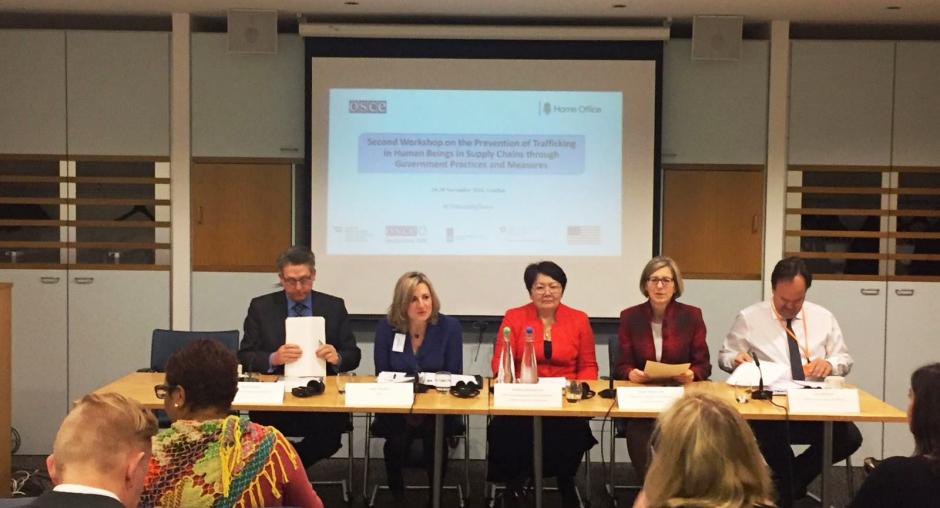OSCE and UK Home Office promote good practices on preventing slavery in supply chains

LONDON, United Kingdom, 29 November 2016 - Ambassador Madina Jarbussynova, OSCE Special Representative and Co-ordinator for Combating Trafficking and Sarah Newton, Minister for Vulnerability, Safeguarding and Countering Extremism of the government of the United Kingdom, opened today a workshop on preventing modern slavery in supply chains.
This two-day OSCE event, co-hosted by the UK Home Office, provides a forum to discuss the issue of human trafficking and labour exploitation in supply chains and explore new ways of addressing modern slavery through government practices and measures, with a special focus on public procurement and transparency.
Over 40 experts and policy makers from different OSCE participating States gather to share learning and good practices and to explore opportunities to further develop co-operation.
The Special Representative praised the UK authorities for adopting innovative policies: “We are inspired by recent developments in the field of preventing trafficking for labour exploitation and hopeful about the future as good practices already exist”, Jarbussynova, stated. “I would like to commend the UK authorities for adopting forward looking policies on transparency in supply chains, where companies have to publicly disclose their efforts in order to ensure that their suppliers are not producing goods or providing services which result from human exploitation. The licencing of suppliers model has also been successfully practiced in the UK by the GLA.”
"The work being undertaken today is of vital importance. Modern Slavery is a barbaric crime which destroys the lives of some of the most vulnerable members of society, and an international response is required to eradicate it”, Minister Newton said. “The UK Government’s ground-breaking Modern Slavery Act introduced a world-leading transparency in supply chains measure which requires large businesses to set out the steps they are taking to ensure there is no modern slavery in their business and supply chains. But there is more to do and we will continue to work with our international partners to explore ways to strengthen our response and encourage consumers, campaigners and investors to scrutinise businesses and hold them to account.”
The knowledge shared during the workshop will enable policymakers from OSCE participating States to develop concrete policies and regulations to create a level playing field for businesses trying to act responsibly, as well as build their capacity to implement such measures to better prevent human trafficking in both public and private sector supply chains.
This initiative is organized under an OSCE extra-budgetary project financially supported by the governments of Austria, Germany, the Netherlands, Switzerland and the USA.
